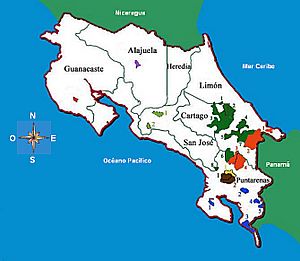Indigenous territory (Costa Rica) facts for kids

| Chorotegas Guatusos HuetaresCabécar | Bribri Térraba Boruca Ngobe |
In Costa Rica, Indigenous Territories are special areas of land. These lands are traditionally home to the indigenous peoples of Costa Rica, who are the first people to live in these areas. Costa Rica officially recognizes eight main groups of native people: the Bribris, Chorotegas, Malekus, Ngöbe, Huetars, Cabecars, Borucas, and Terrabas.
A law from 1977, called the Indigenous Law, says that these territories should have their own self-government. This means the people living there can make decisions about their land and how they organize their communities, following their own traditions. However, putting this law into practice can be challenging. The law also states that people who are not indigenous and own land in these areas should move or be paid for their land. Any land bought in these territories after the law was made is not legal. Sometimes, there are disagreements about who owns the land, which can make things difficult.
Contents
What are Indigenous Territories?
Indigenous Territories are special places set aside for Costa Rica's native peoples. These areas help protect their culture, languages, and way of life. They are important for keeping ancient traditions alive for future generations.
Who Lives in These Territories?
The eight recognized indigenous groups of Costa Rica live in these territories. Each group has its own unique history, language, and customs. For example, the Bribri people are known for their rich oral traditions, while the Maleku people are famous for their traditional crafts.
The Law and Its Purpose
The 1977 Indigenous Law was created to protect the rights of indigenous communities. It aims to ensure they can live on their traditional lands and govern themselves. This law is very important for recognizing the history and contributions of Costa Rica's first inhabitants. While the law is in place, sometimes there are challenges in making sure all its rules are followed perfectly.
List of Indigenous Territories
Currently, Costa Rica has 24 officially recognized indigenous territories. These territories are located in different parts of the country. Each one is home to a specific indigenous group and often has its own unique language spoken alongside Spanish.
| Territory | Ethnicity | Canton | Province | Language | Year of creation |
| Térraba | Teribe people | Buenos Aires | Puntarenas Province | Spanish and Teribe | 1956 |
| Guatuso | Guatuso people | Guatuso and San Carlos | Alajuela Province | Spanish and Maléku | 1977 |
| Kéköldi | Bribri people | Talamanca | Limón Province | Bribri and Spanish | 1977 |
| Quitirrisí | Huetar people | Mora | San José Province | Spanish | 1979 |
| Matambú | Chorotega people | Hojancha and Nicoya | Guanacaste Province | Spanish | 1980 |
| Abrojos Montezuma | Ngabe people | Corredores | Puntarenas Province | Ngäbere | 1980 |
| Coto Brus | Ngabe people | Coto Brus and Buenos Aires | Puntarenas Province | Ngäbere | 1981 |
| Conte Burica | Ngabe people | Golfito and Corredores | Puntarenas Province | Ngäbere | 1982 |
| Ujarrás | Cabécar people | Buenos Aires | Puntarenas Province | Cabécar | 1982 |
| Salitre | Bribri people | Buenos Aires | Puntarenas Province | Bribri and Spanish | 1982 |
| Cabagra | Bribri people | Buenos Aires | Puntarenas Province | Bribri and Spanish | 1982 |
| Tayní | Cabécar people | Limón | Limón Province | Cabécar | 1984 |
| Telire | Cabécar people | Talamanca | Limón Province | Cabécar | 1985 |
| Cabecar Talamanca | Cabécar people | Talamanca | Limón Province | Cabécar | 1985 |
| Bribri Talamanca | Bribri people | Talamanca | Limón Province | Bribri and Spanish | 1985 |
| Zapatón | Huetar people | Puriscal | San José Province | Spanish | 1986 |
| Ngobe-Bugle | Ngabe people | Golfito and Osa | Puntarenas Province | Ngäbere | 1990 |
| Nairi-Awari | Cabécar people | Turrialba, Matina and Siquirres | Cartago Province Limón Province |
Cabécar | 1991 |
| Bajo Chirripó | Cabécar people | Turrialba and Limón | Cartago Province Limón Province |
Cabécar | 1992 |
| Alto Chirripó | Cabécar people | Turrialba and Matina | Cartago Province Limón Province |
Cabécar | 1993 |
| Curré | Brunca people | Buenos Aires | Puntarenas Province | Boruca | 1993 |
| Boruca | Brunca people | Buenos Aires | Puntarenas Province | Boruca | 1993 |
| China Kichá | Cabécar people | Pérez Zeledón | San José Province | Cabécar | 2001 |
| Altos de San Antonio | Ngabe people | Golfito | Puntarenas Province | Ngäbere | 2001 |
See also

- In Spanish: Territorios indígenas de Costa Rica para niños
 | DeHart Hubbard |
 | Wilma Rudolph |
 | Jesse Owens |
 | Jackie Joyner-Kersee |
 | Major Taylor |

